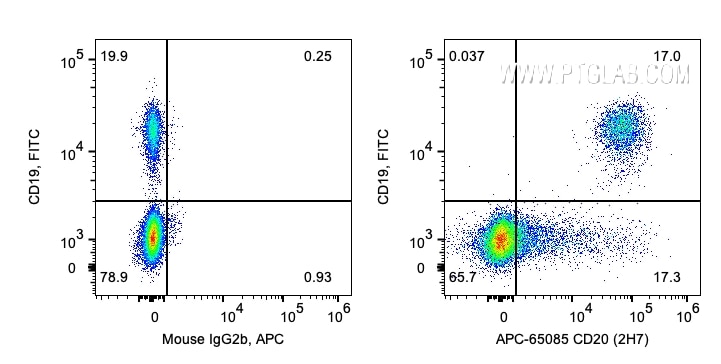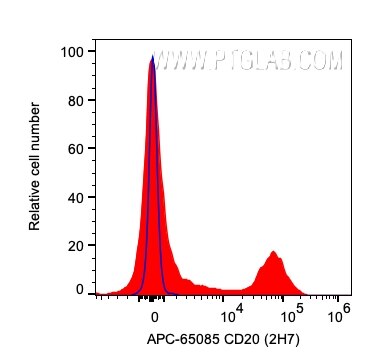CD20 Monoklonaler Antikörper
CD20 Monoklonal Antikörper für FC
Wirt / Isotyp
Maus / IgG2b, kappa
Getestete Reaktivität
human
Anwendung
FC
Konjugation
APC Fluorescent Dye
CloneNo.
2H7
Kat-Nr. : APC-65085
Synonyme
Galerie der Validierungsdaten
Geprüfte Anwendungen
| Erfolgreiche Detektion in FC | humane PBMCs |
Empfohlene Verdünnung
| Anwendung | Verdünnung |
|---|---|
| This reagent has been pre-titrated and tested for flow cytometric analysis. The suggested use of this reagent is 5 μl per 10^6 cells in a 100 µl suspension or 5 μl per 100 µl of whole blood. | |
| Sample-dependent, check data in validation data gallery | |
Produktinformation
APC-65085 bindet in FC CD20 und zeigt Reaktivität mit human
| Getestete Reaktivität | human |
| Wirt / Isotyp | Maus / IgG2b, kappa |
| Klonalität | Monoklonal |
| Typ | Antikörper |
| Immunogen | Humane tonsillare B-Zellen |
| Vollständiger Name | membrane-spanning 4-domains, subfamily A, member 1 |
| Berechnetes Molekulargewicht | 297 aa, 33 kDa |
| GenBank-Zugangsnummer | BC002807 |
| Gene symbol | MS4A1 |
| Gene ID (NCBI) | 931 |
| Konjugation | APC Fluorescent Dye |
| Excitation/Emission maxima wavelengths | 650 nm / 660 nm |
| Form | Liquid |
| Reinigungsmethode | Affinitätsreinigung |
| Lagerungspuffer | PBS with 0.09% sodium azide and 0.5% BSA. |
| Lagerungsbedingungen | Store at 2-8°C. Avoid exposure to light. Stable for one year after shipment. |
Hintergrundinformationen
CD20 is a 33-37 kDa transmembrane phosphoprotein belonging to the membrane-spanning 4A family (PMID: 3260267; 16785532). CD20 is a B-lymphocyte surface molecule that is widely expressed during B-cell ontogeny, from early pre-B-cell developmental stages until final differentiation into plasma cells (PMID: 7524522). CD20 functions as calcium-permeable cation channel (PMID: 7684739). It is involved in the regulation of B-cell activation, proliferation and differentiation (PMID: 7524522).
Protokolle
| Produktspezifische Protokolle | |
|---|---|
| FC protocol for APC CD20 antibody APC-65085 | Protokoll herunterladen |
| Standard-Protokolle | |
|---|---|
| Klicken Sie hier, um unsere Standardprotokolle anzuzeigen |



